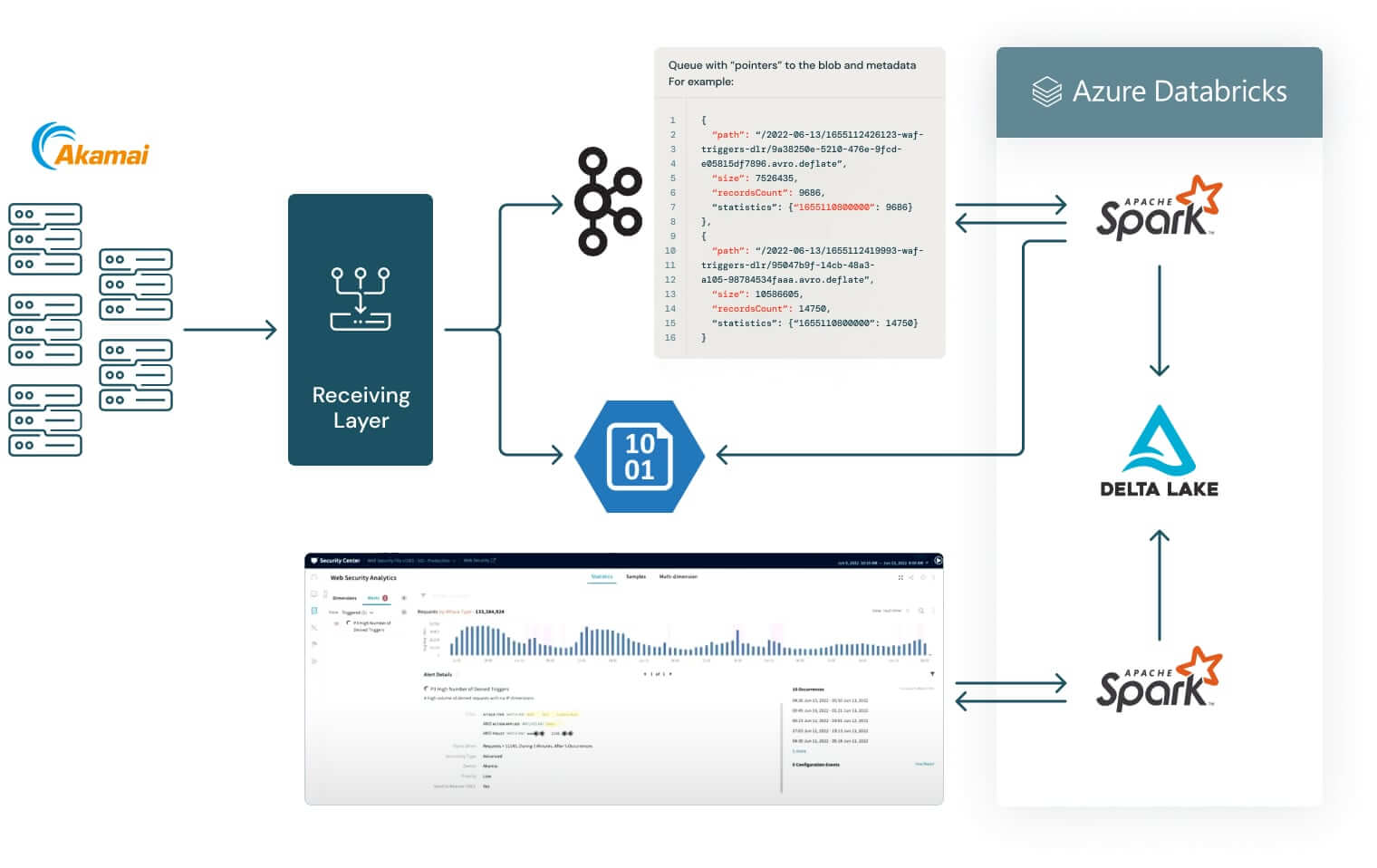Product descriptions:
Akamai runs a pervasive, highly distributed content delivery network (CDN). Its CDN uses approximately 345,000 servers in more than 135 countries and over 1,300 networks worldwide to route internet traffic for some of the largest enterprises in media, commerce, finance, retail and many other industries. About 30% of the internet’s traffic flows through Akamai servers. Akamai also provides cloud security solutions. In 2018, the company launched a web security analytics tool that offers Akamai customers a single, unified interface for assessing a wide range of streaming security events and perform analysis of those events. The web analytics tool helps Akamai customers to take informed actions in relation to security events in real-time. Akamai is able to stream massive amounts of data and meet the strict SLAs it provides to customers by leveraging Delta Lake and the Databricks Data Intelligence Platform for the web analytics tool.
Ingesting and streaming enormous amounts of data
Akamai’s web security analytics tool ingests approximately 10GB of data related to security events per second. Data volume can increase significantly when retail customers conduct a large number of sales — or on big shopping days like Black Friday or Cyber Monday. The web security analytics tool stores several petabytes of data for analysis purposes. Those analyses are performed to protect Akamai’s customers and provide them with the ability to explore and query security events on their own.
The web security analytics tool initially relied on an on-premises architecture running Apache Spark™ on Hadoop. Akamai offers strict service level agreements (SLAs) to its customers of 5 to 7 minutes from when an attack occurs until it is displayed in the tool. The company sought to improve ingestion and query speed to meet those SLAs. “Data needs to be as real-time as possible so customers can see what is attacking them,” says Tomer Patel, Engineering Manager at Akamai. “Providing queryable data to customers quickly is critical. We wanted to move away from on-prem to improve performance and our SLAs so the latency would be seconds rather than minutes.”
After conducting proofs of concept with several companies, Akamai chose to base its streaming analytics architecture on Spark and the Databricks Data Intelligence Platform. “Because of our scale and the demands of our SLA, we determined that Databricks was the right solution for us,” says Patel. “When we consider storage optimization, and data caching, if we went with another solution, we couldn't achieve the same level of performance.”
Improving speed and reducing costs
Today, the web security analytics tool ingests and transforms data, stores it in cloud storage, and sends the location of the file via Kafka. It then uses a Databricks Job as the ingest application. Delta Lake, the open source storage format at the base of the Databricks Data Intelligence Platform, supports real-time querying on the web security analytics data. Delta Lake also enables Akamai to scale quickly. “Delta Lake allows us to not only query the data better but to also acquire an increase in the data volume,” says Patel. “We’ve seen an 80% increase in traffic and data in the last year, so being able to scale fast is critical.”
Akamai also uses Databricks SQL (DBSQL) and Photon, which provide extremely fast query performance. Patel added that Photon provided a significant boost to query performance. Overall, Databricks’ streaming architecture combined with DBSQL and Photon enables Akamai to achieve real-time analytics, which translates to real-time business benefits.
Patel says he likes that Delta Lake is open source, as the company has benefitted from a community of users working to improve the product. “The fact that Delta Lake is open source and there’s a big community behind it means we don’t need to implement everything ourselves,” says Patel. “We benefit from fixed bugs that others have encountered and from optimizations that are contributed to the project.” Akamai worked closely with Databricks to ensure Delta Lake can meet the scale and performance requirements Akamai defined. These improvements have been contributed back to the project (many of which were made available as part of Delta Lake 2.0), and so any user running Delta Lake now benefits from the technology being tested at such a large scale in a real-world production scenario.

Meeting aggressive requirements for scale, reliability and performance
Using Spark Structured Streaming on the Databricks Data Intelligence Platform enables the web security analytics tool to stream vast volumes of data and provide low-latency, real-time analytics-as-a-service to Akamai’s customers. That way Akamai is able to make available security event data to customers within the SLA of 5 to 7 minutes from when an attack occurs. “Our focus is performance, performance, performance,” says Patel. “The platform’s performance and scalability are what drives us.”
Using the Databricks Data Intelligence Platform, it now takes under 1 minute to ingest the security event data. “Reducing ingestion time from 15 minutes to under 1 minute is a huge improvement,” says Patel. “It benefits our customers because they can see the security event data faster and they have a view of what exactly is happening as well as the capability to filter all of it.”
Akamai’s biggest priority is to provide customers with a good experience and fast response times. To date, Akamai has moved about 70% of security event data from its on-prem architecture to Databricks, and the SLA for customer query and response time has improved significantly as a result. “Now, with the move to Databricks, our customers experience much better response time, with over 85% of queries completing under 7 seconds.” Providing that kind of real-time data means Akamai can help its customers stay vigilant and maintain an optimal security configuration.
